| Listing 1 - 10 of 18 | << page >> |
Sort by
|
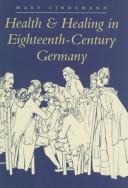
ISBN: 0801852811 Year: 1996 Volume: 114th series, 4 Publisher: Baltimore Johns Hopkins University Press
Abstract | Keywords | Export | Availability | Bookmark
 Loading...
Loading...Choose an application
- Reference Manager
- EndNote
- RefWorks (Direct export to RefWorks)
History of human medicine --- History of Germany and Austria --- anno 1700-1799 --- Genezing en gezondheid in de achttiende eeuw in Duitsland --- Gezondheid en genezing in de achttiende eeuw in Duitsland --- Guérison et santé au dix-huitième siècle en Allemagne --- Health and healing in eighteenth-century Germany --- Santé et guérison au dix-huitième siècle en Allemagne --- Social medicine --- Medicine --- History of Medicine, 18thCent. --- History --- Germany --- 18th century --- History of Medicine
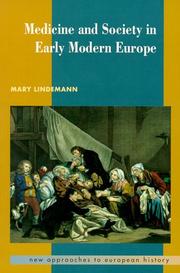
ISBN: 0521423546 Year: 1999 Volume: 16 Publisher: Cambridge, UK New York, NY, USA Cambridge University Press
Abstract | Keywords | Export | Availability | Bookmark
 Loading...
Loading...Choose an application
- Reference Manager
- EndNote
- RefWorks (Direct export to RefWorks)
History of Europe --- History of human medicine --- anno 1500-1799 --- Social medicine --- Medicine --- -Medical care --- -Public health --- -Community health --- Health services --- Hygiene, Public --- Hygiene, Social --- Public health services --- Public hygiene --- Sanitary affairs --- Social hygiene --- Health --- Human services --- Biosecurity --- Health literacy --- Medicine, Preventive --- National health services --- Sanitation --- Delivery of health care --- Delivery of medical care --- Health care --- Health care delivery --- Healthcare --- Medical and health care industry --- Medical services --- Personal health services --- Public health --- Clinical sciences --- Medical profession --- Human biology --- Life sciences --- Medical sciences --- Pathology --- Physicians --- Medical care --- Medical sociology --- Medicine, Social --- Public welfare --- Sociology --- Medical ethics --- Medical sociologists --- History. --- History --- Social aspects --- -History. --- Europe
Multi
ISBN: 9781107074439 9781107426290 9781139696852 1107074436 1107426294 1316211940 1316191591 1316189759 1316206394 131621009X 1316208249 1316204596 1316202755 132288224X 1139696858 Year: 2017 Publisher: Cambridge: Cambridge university press,
Abstract | Keywords | Export | Availability | Bookmark
 Loading...
Loading...Choose an application
- Reference Manager
- EndNote
- RefWorks (Direct export to RefWorks)
"The Merchant Republics analyzes the ways in which three major economic powerhouses -- Amsterdam, Antwerp and Hamburg -- developed dual identities as 'communities of commerce' and as republics over the course of the long eighteenth century (c.1648-1790). In addition to discussing the qualities that made these three cities alike, this volume also considers the very real differences that derived from their dissimilar histories, political structures, economic fates and cultural expectations. While all valued both their republicanism and their merchant identities, each presented a different face to the world and each made the transition from an early modern republic to a modern city in a different manner"--
Commerce --- Republics --- --XVIIIe s., --- République urbaine --- --Amsterdam --- --Anvers --- --Hamburg --- --History --- Amsterdam (Netherlands) --- Antwerp (Belgium) --- Hamburg (Germany) --- History --- Republics. --- Europe --- General. --- History of Europe --- anno 1700-1799 --- anno 1600-1699 --- Amsterdam --- Antwerp --- Hamburg --- Amsterdam (Pays-Bas) --- Anvers (Belgique) --- Hambourg (Allemagne) --- republics --- commercial centers [inhabited places] --- Commerce - History - 18th century --- XVIIIe s., 1701-1800 --- Anvers --- Amsterdam (Netherlands) - History - 18th century --- Antwerp (Belgium) - History - 18th century --- Hamburg (Germany) - History - 18th century --- Commonwealth, The --- Constitutional history --- Constitutional law --- Political science --- Democracy --- Representative government and representation --- Trade --- Traffic (Commerce) --- Economics --- Business --- Merchants --- Transportation --- Hamburgo (Germany) --- Hambourg (Germany) --- Hamburgh (Germany) --- ハンブルク (Germany) --- Hanburuku (Germany) --- Anṿerśah (Belgium) --- Anṭṿerpen (Belgium) --- Antwerpen (Belgium) --- Antuerpia (Belgium) --- Anvers (Belgium) --- Anversa (Belgium) --- Antwerpia (Belgium) --- Anwerpia (Belgium) --- Andowerpia (Belgium) --- Amberes (Belgium) --- Antverpia (Belgium) --- Ambivaritum (Belgium) --- Anderpus (Belgium) --- Andevorpum (Belgium) --- Andoverpis (Belgium) --- Andoverpum (Belgium) --- Antwerpha (Belgium) --- Antwerpium (Belgium) --- Antwerpo (Belgium) --- Antwerpum (Belgium) --- Handoverpia (Belgium) --- Andwerpa (Belgium) --- Antverpis (Belgium) --- Antverpo (Belgium) --- Antverpum (Belgium) --- אנטווערפען --- Amesterdão (Netherlands) --- Amstelodamum (Netherlands) --- Amstelaedamum (Netherlands) --- Amstelredamum (Netherlands) --- Amsterodamum (Netherlands) --- Amstelrodamum (Netherlands)
Book
ISBN: 9780521732567 9780521425926 0521732565 0521425921 Year: 2010 Publisher: Cambridge: Cambridge university press,
Abstract | Keywords | Export | Availability | Bookmark
 Loading...
Loading...Choose an application
- Reference Manager
- EndNote
- RefWorks (Direct export to RefWorks)
"Medicine and Society in Early Modern Europe offers students a concise introduction to health and healing in Europe from 1500 to 1800. Bringing together the best recent research in the field, Mary Lindemann examines medicine from a social and cultural perspective, rather than a narrowly scientific one. Drawing on medical anthropology, sociology and ethics as well as cultural and social history, she focuses on the experience of illness and on patients and folk healers as much as on the rise of medical science, doctors and hospitals. This second edition has been updated and revised throughout in content, style, and interpretations and new material has been added, in particular, on colonialism, exploration and women. Accessibly written and full of fascinating insights, this will be essential reading for all students of the history of medicine and will provide invaluable context for students of early modern Europe more generally"--Provided by publisher.
Social medicine --- Medicine --- Medical care --- Public health --- History of Medicine --- History, 16th Century --- History, 17th Century --- History, 18th Century --- Public Health --- Social Medicine --- History --- history --- Médecine sociale --- Santé publique --- Medical sociology --- Medicine, Social --- Public welfare --- Sociology --- Medical ethics --- Medical sociologists --- Community health --- Health services --- Hygiene, Public --- Hygiene, Social --- Public health services --- Public hygiene --- Sanitary affairs --- Social hygiene --- Health --- Human services --- Biosecurity --- Health literacy --- Medicine, Preventive --- National health services --- Sanitation --- Delivery of health care --- Delivery of medical care --- Health care --- Health care delivery --- Healthcare --- Medical and health care industry --- Medical services --- Personal health services --- Social aspects --- History of Europe --- History of human medicine --- anno 1500-1799 --- History. --- Médecine --- Soins médicaux --- Histoire --- Health Workforce --- Social medicine - Europe - History --- Medicine - Europe - History --- Medical care - Europe - History --- Public health - Europe - History --- History of Medicine - Europe --- History, 16th Century - Europe --- History, 17th Century - Europe --- History, 18th Century - Europe --- Public Health - history - Europe --- Social Medicine - history - Europe
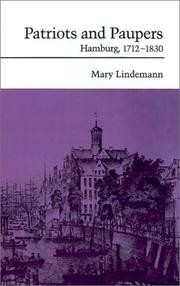
ISBN: 0195061403 Year: 1990 Publisher: Oxford Oxford University Press
Abstract | Keywords | Export | Availability | Bookmark
 Loading...
Loading...Choose an application
- Reference Manager
- EndNote
- RefWorks (Direct export to RefWorks)
History of Germany and Austria --- anno 1700-1799 --- anno 1800-1899 --- Hamburg --- Pauvres --- Histoire --- Hambourg (allemagne) --- Charite --- 18e siecle --- Conditions sociales

ISBN: 1280524359 1423737202 0195362918 1601297505 9781423737209 9780195061406 0195061403 9781280524356 0195061403 9786610524358 6610524351 0197715281 Year: 1990 Publisher: New York Oxford University Press
Abstract | Keywords | Export | Availability | Bookmark
 Loading...
Loading...Choose an application
- Reference Manager
- EndNote
- RefWorks (Direct export to RefWorks)
Hamburg experienced enormous growth in the 18th century, and with it a dramatic increase in the urban poor population. This is a study of the city's response to these enormous changes in its political and social structure.
Public welfare --- Charities --- Middle class --- Alms and almsgiving --- Benevolent institutions --- Charitable institutions --- Endowed charities --- Institutions, Charitable and philanthropic --- Philanthropy --- Poor relief --- Private nonprofit social work --- Relief (Aid) --- Social welfare --- Associations, institutions, etc. --- Poor --- Social service --- Endowments --- Public assistance --- Public charities --- Public relief --- Public welfare reform --- Welfare (Public assistance) --- Welfare reform --- Human services --- Bourgeoisie --- Commons (Social order) --- Middle classes --- Social classes --- History --- Political activity --- Societies, etc. --- Services for --- Government policy --- Social conditions
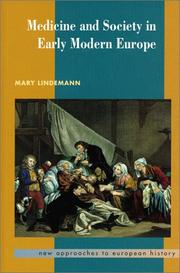
ISBN: 0521412544 Year: 1999 Publisher: Cambridge Cambridge University Press
Abstract | Keywords | Export | Availability | Bookmark
 Loading...
Loading...Choose an application
- Reference Manager
- EndNote
- RefWorks (Direct export to RefWorks)
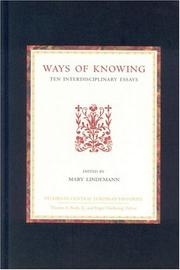
ISBN: 9789004476042 9780391041844 Year: 2004 Publisher: Leiden; Boston : BRILL
Abstract | Keywords | Export | Availability | Bookmark
 Loading...
Loading...Choose an application
- Reference Manager
- EndNote
- RefWorks (Direct export to RefWorks)
Knowing itself is a problematic concept and what was once seen as the clear objective of "knowing," that is to discover "truth" or "reality," has become increasingly less certain. This is even more the case when scholars move from the present to examine epistemology in the past. Two fundamental questions arise: What constituted knowledge in the context of early modern Germany and how was knowledge gathered, assembled, organized, deployed, and interpreted? Ways of Knowing seeks to answer these questions. Taking their cues from a range of interdisciplinary perspectives, including art, German literature, social, political, medical, and religious history, the contributors offer readers a rich and insightful portrait of knowing and knowledge in early modern Germany. Investigators look at what people "knew" in early modern Germany and how they "knew" it. Four essays in part one consider how knowledge was created and organized. In part two, six authors examine how knowledge was evaluated and how it functioned, especially in the realms of belief, law, politics, and medicine. Contributors include: Robert Beachy, Susan R. Boettcher, Jason Coy, Pia F. Cuneo, Mitchell Lewis Hammond, Mary Lindemann, Francisca Loetz, Terence McIntosh, Janice L. Neri, Elisabeth Wåghäll Nivre, and Helen Watanabe-O'Kelly.
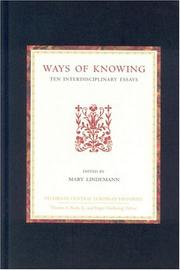
Abstract | Keywords | Export | Availability | Bookmark
 Loading...
Loading...Choose an application
- Reference Manager
- EndNote
- RefWorks (Direct export to RefWorks)
History of civilization --- History of Europe --- anno 1500-1799 --- Knowledge [Sociology of ] --- Congresses --- Social epistemology
Book
ISBN: 1800734492 178533588X 1785335898 Year: 2017 Publisher: New York : Berghahn Books,
Abstract | Keywords | Export | Availability | Bookmark
 Loading...
Loading...Choose an application
- Reference Manager
- EndNote
- RefWorks (Direct export to RefWorks)
Money is more than just a medium of financial exchange: across time and place, it has performed all sorts of cultural, political, and social functions. This volume traces money in German-speaking Europe from the late Renaissance until the close of the twentieth century, exploring how people have used it and endowed it with multiple meanings. The fascinating studies gathered here collectively demonstrate money’s vast symbolic and practical significance, from its place in debates about religion and the natural world to its central role in statecraft and the formation of national identity.
Money --- History. --- Europe, German-speaking --- Germany
| Listing 1 - 10 of 18 | << page >> |
Sort by
|

 Search
Search Feedback
Feedback About UniCat
About UniCat  Help
Help News
News